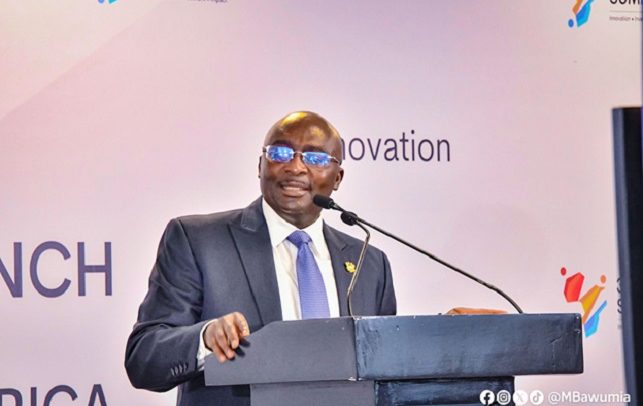Dr. Mahamudu Bawumia
Vice President Dr. Mahamudu Bawumia has stated that the next step in Ghana’s digital transformation will be to become Africa’s first blockchain-powered government.
According to him, the adoption of blockchain technology, which can identify and detect changes in digital data in order to trace all transactions in the governance space, will enable the government to fight corruption and promote transparency in the country.
Addressing the 14th Regional Conference and Annual General Meeting of Heads of Anti-Corruption Agencies in Commonwealth Africa in Accra yesterday, Dr. Bawumia highlighted some of the government’s digital initiatives and announced that blockchain technology would be the next addition.
He explained blockchain technology as a structure that stores transactional records, also known as the block, of the public in several databases, known as the chain, in a network connected through peer-to-peer nodes.
Typically, this storage is referred to as a ‘digital ledger’, he noted and continued that it allows crypto assets to be transferred quickly and decidedly with protocols that can be automated and decentralised, thus enabling the creation of crypto assets without the need for controlling, supervisory or centralised bodies.
For instance, he said the ghana.gov portal, which was a one-stop platform for paying public services electronically, enabled the government to collect GH¢201 billion from 2020.
With the digitalisation of passport application at the Passport Office, he said passport applications jumped from 347,000 to 752,000 while its revenues increased from GH¢12 million to GH¢94 million between 2018 and 2023.
Apart from that, he indicated that the integration of the public sector databases through the use of Ghana Card enabled the Controller and Accountant General’s Department to expunge 29,000 ‘ghost’ pensioners from the public sector payroll, saving the nation GH¢480 million annually.
The Vice President therefore insisted that the use of a unique identity card (Ghana Card) enabled the government to detect 44,707 ghost names on the National Service Scheme payroll and saved the nation GH¢356 million.
In view of that, he entreated anti-corruption agencies in Africa to invest in digital forensics and tools to assist them to track, trace and distract the corruption value chain.
He also asked the anti-graft institutions in Africa to acquire customised security operation centres to enable them to fight corruption networks.
Dr. Bawumia was of the conviction that Ghana could fight corruption more efficiently if the Bank of Ghana finally introduced the Central Bank Digital Currency (CBDC), otherwise known as the eCedi.
“The Central Bank Digital Currency will be our ultimate weapon in our fight against corruption because the eCedi will make it easy to track the movements of money and identify suspicious activities,” Dr. Bawumia stated.
He said it would also enable the Central Bank to ensure high-level transparency, reduce the risk of fraud, tax avoidance and money laundering.
The week-long conference was on the theme: “Strengthening Institutions and Promoting Transparency: A Means of Fighting Corruption in Commonwealth Africa”.
It attracted 20 Commonwealth African countries to deliberate on ways to make corruption unattractive in Africa and promote wealth creation.
By Charles Takyi-Boadu, Presidential Correspondent

